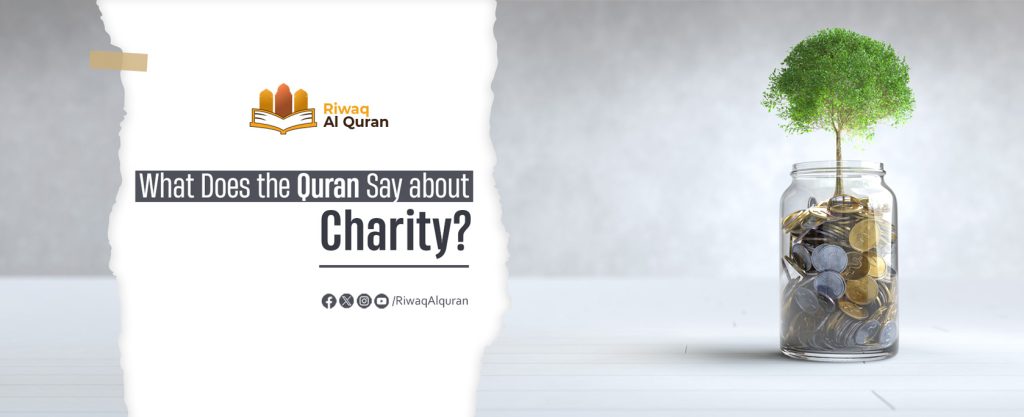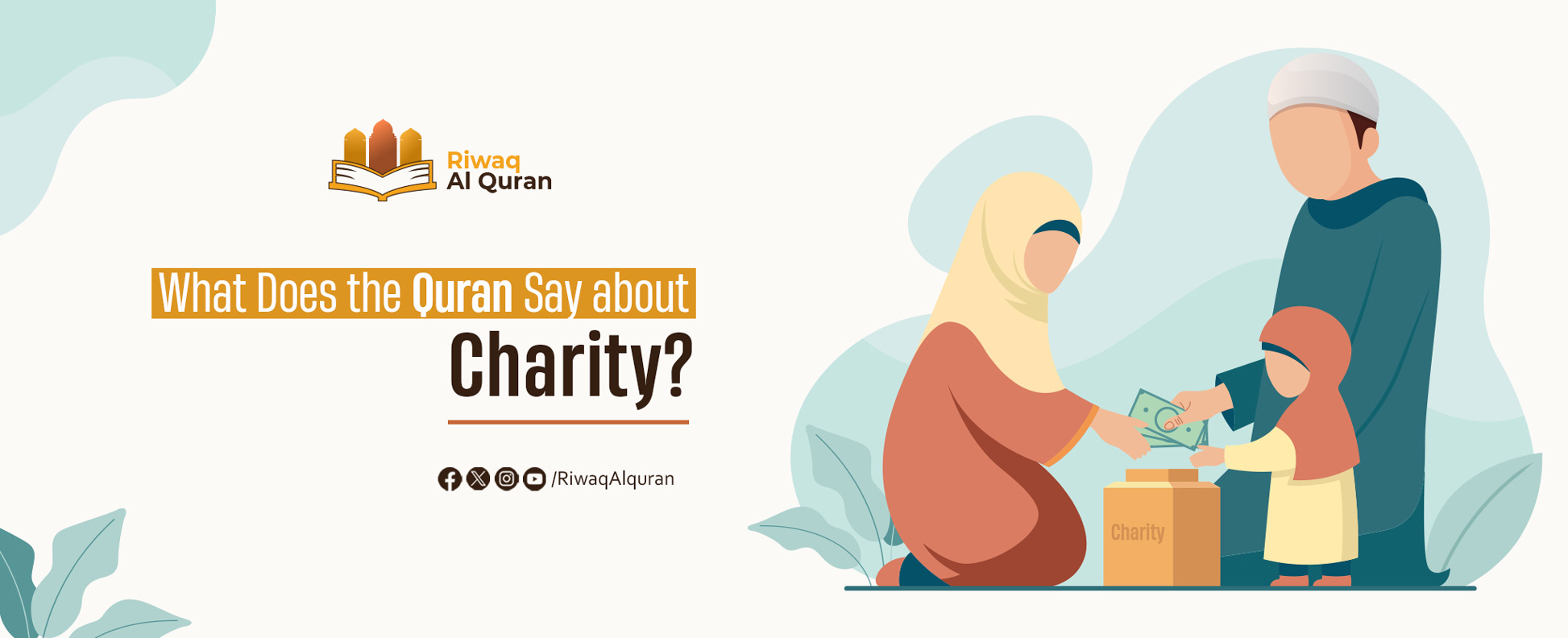The Quran places a significant emphasis on Sadaqah, known as “sadaqah” and “zakat.” These acts of giving are not just encouraged but are deemed essential for the spiritual growth and social welfare of the Muslim community.
Table of Contents
What Does the Quran Say About Charity?
Charity in Islam is viewed as a means of purifying one’s wealth, protecting it from misfortune, and gaining blessings. The Quran consistently calls upon Muslims to support the needy, the poor, and those in distress.
It also highlights the importance of starting this act of kindness with one’s family and relatives, ensuring their welfare and well-being, including their spiritual growth and Quranic education, such as through institutions like Riwaq Al Quran.
The Quran provides numerous examples and directives about charity, reinforcing its importance in the daily lives of Muslims. These verses serve as powerful reminders of the spiritual and material rewards that come with charitable acts. For example:
“Who is it that will loan Allah a goodly loan so He may multiply it for him many times over? And it is Allah who withholds and grants abundance, and to Him, you will be returned.” (Quran 2:245)
“And establish prayer and give zakah, and whatever good you put forward for yourselves – you will find it with Allah. Indeed, Allah of what you do, is Seeing.” (Quran 2:110)
Importance of Charity in Islam
Charity holds a place of great importance in Islamic teachings, and it is regarded as a virtue that brings numerous benefits both in this world and in the hereafter. The Quran provides clear guidance on the significance of charity and its various forms, urging believers to be generous and compassionate. Here are some benefits:
1. Purification of Wealth and Soul
One of the primary purposes of charity in Islam is the purification of wealth and soul. The following verse emphasizes that giving charity cleanses one’s wealth from impurities and brings about spiritual and material increase. It reinforces the belief that wealth is a trust from Allah, and sharing it with those in need purifies both the giver and their possessions. The Quran states:
“Take from their wealth a charity by which you purify them and cause them increase, and invoke [Allah’s blessings] upon them. Indeed, your invocations are reassurance for them. And Allah is Hearing and Knowing.” (Quran 9:103)
2. Social Justice and Equity
Charity also plays a critical role in promoting social justice and equity. The Quran repeatedly encourages believers to support those who are less fortunate and highlights the duty of the wealthy to allocate a portion of their wealth to help the needy, ensuring that resources are distributed more equitably within society:
“And those within whose wealth is a known right. For the petitioner and the deprived.” (Quran 70:24-25)
3. Strengthening Community Bonds
Charity fosters a sense of community and solidarity among Muslims. By giving to others, believers build strong bonds of kinship and mutual support. The Quran underscores this communal aspect of charity as follows:
“The example of those who spend their wealth in the way of Allah is like a seed [of grain] that sprouts seven ears; in every ear are a hundred grains. And Allah multiplies [His reward] for whom He wills. And Allah is All-Encompassing and Knowing.” (Quran 2:261)
4. Charity as a Means to Attain Righteousness
The Quran also associates charity with piety and emphasizes the importance of selflessness and the willingness to part with one’s cherished possessions in the pursuit of righteousness. It is a means through which believers can attain a higher spiritual status. Allah says:
“Never will you attain the good [reward] until you spend [in the way of Allah] from that which you love. And whatever you spend – indeed, Allah is Knowing of it.” (Quran 3:92)
5. Protection from Calamities and Hardships
Charity in Islam is believed to act as a shield against misfortunes and difficulties. By giving to those in need, believers can avert potential calamities and gain protection from adversities. The Prophet Muhammad (peace be upon him) emphasized this when he said:
“Give charity without delay, for it stands in the way of calamity.” (Tirmidhi)
6. Earning Allah’s Pleasure and Forgiveness
Charity is a means of earning Allah’s pleasure and forgiveness. The Quran and Hadith frequently mention that those who give generously will find favor with Allah and attain His mercy. Allah promises forgiveness and ample reward for those who are charitable:
“If you disclose your charitable expenditures, they are good; but if you conceal them and give them to the poor, it is better for you, and He will remove from you some of your misdeeds [thereby]. And Allah, with what you do, is [fully] Acquainted.” (Quran 2:271)
7. Increasing Blessings and Sustenance
Charity is a means of increasing one’s blessings and sustenance. The Quran assures believers that giving in the way of Allah does not decrease wealth; rather, it leads to increased blessings and abundance. Allah says:
“The example of those who spend their wealth in the way of Allah is like a grain of corn: it grows seven ears, and each ear has a hundred grains. Allah gives manifold increase to whom He pleases.” (Quran 2:261)


How Many Times Sadaqah is Mentioned in the Quran?
The term Sadaqah appears in the Quran numerous times, each instance emphasizing the importance and benefits of charitable giving. The exact number of occurrences can vary depending on the translation and interpretation such as:
- Sadaqah (صدقة)
- Zakah (زكاة)
- Infaq (إنفاق)
- Ihsan (إحسان)
- Sadaqat (صدقات)
Overall, while the term “Sadaqah” alone is mentioned several times, the broader concept of charity is emphasized extensively throughout the Quran using other various terms, highlighting the importance of charitable actions and social welfare in Islam.
Examples of Charity in Islam
Islamic teachings provide a wide array of examples and forms of charity, each tailored to different circumstances and needs. Here are some notable examples:
1. Zakat (Obligatory Charity)
Zakat is one of the Five Pillars of Islam and is mandatory for all eligible Muslims. It requires giving a fixed portion (usually 2.5%) of one’s accumulated wealth annually to specified categories of recipients, including the poor, the needy, those in debt, and others mentioned in the Quran:
“Zakah expenditures are only for the poor and for the needy and for those employed to collect [zakah] and for bringing hearts together [for Islam] and for freeing captives [or slaves] and for those in debt and for the cause of Allah and for the [stranded] traveler – an obligation [imposed] by Allah. And Allah is Knowing and Wise.” (Quran 9:60)
2. Sadaqah (Voluntary Charity)
Sadaqah encompasses all forms of voluntary charity, which can include monetary donations, acts of kindness, and providing support to those in need. The Quran encourages Muslims to give sadaqah regularly and generously, regardless of the amount:
“O you who have believed, spend from that which We have provided for you before there comes a Day in which there is no exchange and no friendship and no intercession. And the disbelievers – they are the wrongdoers.” (Quran 2:254)
3. Sadaqah Jariyah (Continuous Charity)
Sadaqah Jariyah refers to charity that continues to benefit others even after the giver has passed away. Examples include building wells, funding educational institutions, and providing resources that have a long-lasting impact. Prophet Muhammad said:
“When a person dies, all their deeds end except three: a continuing charity, beneficial knowledge, and a child who prays for them.” (Sahih Muslim)
4. Providing for Family and Relatives
Islam places great emphasis on starting acts of charity within one’s own family and relatives. Ensuring their well-being and supporting their religious education, such as through Quranic studies at institutions like Riwaq Al Quran, is highly encouraged. The Prophet Muhammad said:
“The best of you are those who learn the Quran and teach it.” (Sahih Bukhari)
By prioritizing family and relatives in acts of charity, Muslims fulfill their duty of kinship and strengthen familial bonds, contributing to the overall well-being of their immediate community.
5. Helping Orphans and Widows
The Quran specifically mentions the importance of supporting orphans and widows, who are often among the most vulnerable members of society. Caring for them is considered a noble act of charity:
“And they give food in spite of love for it to the needy, the orphan, and the captive.” (Quran 76:8)
6. Feeding the Hungry
Feeding the hungry is a fundamental act of charity in Islam. The Quran encourages Muslims to provide food to those in need, emphasizing the importance of generosity and compassion:
“And they give food in spite of love for it to the needy, the orphan, and the captive, [saying], ‘We feed you only for the countenance of Allah. We wish not from you reward or gratitude.'” (Quran 76:8-9)

How to Train Yourself to Give Sadaqah Regularly?
Training oneself to give charity regularly involves cultivating a mindset and establishing practical habits that make charitable giving a consistent part of your life. Here are some steps you can take:
1. Set Your Intention (Niyyah):
Begin by sincerely intending to give sadaqah regularly solely to please Allah. Your intention should be pure and focused on seeking His pleasure and blessings through your charitable acts. This intention forms the spiritual foundation of your giving, keeping you motivated and aligned with your faith values.
2. Start Small and Build Up:
Start your charitable giving journey with a modest amount that you can comfortably afford, even if it seems small. Remember the hadith of the Prophet Muhammad (peace be upon him) that emphasizes the importance of consistency over the amount given.
3. Allocate a Portion of Your Income:
Decide on a specific portion or percentage of your income that you will allocate to sadaqah regularly. This could be monthly, weekly, or daily, depending on your financial situation and preferences. Setting a specific amount ensures that giving becomes a regular and planned part of your budget.
4. Make a Budget for Sadaqah:
Treat charitable giving as a priority in your financial planning. Include it as a separate item in your budget alongside other essential expenses like bills and savings. This approach helps you manage your finances responsibly while ensuring that sadaqah receives due consideration.
5. Identify Causes You Care About:
Take the time to research and identify reputable charitable organizations or causes that resonate with your values and priorities. Knowing where your money is going and how it will be used enhances your motivation and satisfaction in giving.
6. Use Technology and Automation:
Simplify the process of giving by setting up automatic transfers or donations through your bank or online platforms. Automating your charitable contributions ensures consistency and reduces the chance of forgetting or missing donations.
7. Educate Yourself about the Rewards of Sadaqah:
Learn about the spiritual, psychological, and social benefits of giving sadaqah. Understand the rewards and virtues associated with sadaqah in your faith. This knowledge reinforces your commitment and motivates you to continue giving regularly.
8. Encourage Accountability:
Share your commitment to regular sadaqah giving with a trusted friend, family member, or community member. Discussing your goals and progress with someone who supports and encourages you can help maintain your commitment and accountability.
9. Reflect on Your Giving:
Regularly reflect on the impact of your sadaqah. Consider how your contributions are making a difference in the lives of others or in causes you support. Reflection deepens your sense of fulfillment and purpose in giving, encouraging you to continue and possibly increase your charitable efforts.
By implementing these clarified steps into your life, you can effectively train yourself to give charity regularly, transforming it into a meaningful and sustainable practice that benefits both yourself and others.
Learn More About Islam with Riwaq Al Quran
Prioritizing charity within one’s family and relatives, such as supporting their Quranic education through institutions like Riwaq Al Quran, further strengthens the fabric of the Muslim community. Charity, in all its forms, is a powerful tool for spiritual growth, social harmony, and the betterment of humanity as a whole.


Riwaq Al Quran is a comprehensive online platform that offers personalized Quran, Arabic and Islamic Studies Online classes for individuals of all ages and backgrounds.
Their experienced instructors use a structured curriculum to cover Tajweed, Tafsir, and Memorization, providing easy and effective access to learning the Quran.
The advanced online classes allow for seamless communication and interaction between students and teachers. Join Riwaq Al Quran for a deeper connection with the Quran.
We offer several courses such as:
- Online courses for kids.
- Online Quran classes for kids and adults.
- Online Arabic courses
- Online Ijazah courses
- Online Islamic Studies courses.
Conclusion
The Quran’s teachings on charity underscore its profound importance in Islam, reflecting a deep commitment to social justice, compassion, and community welfare. By adhering to these principles, Muslims not only fulfill their religious duties but also contribute to a more equitable and compassionate society.


































